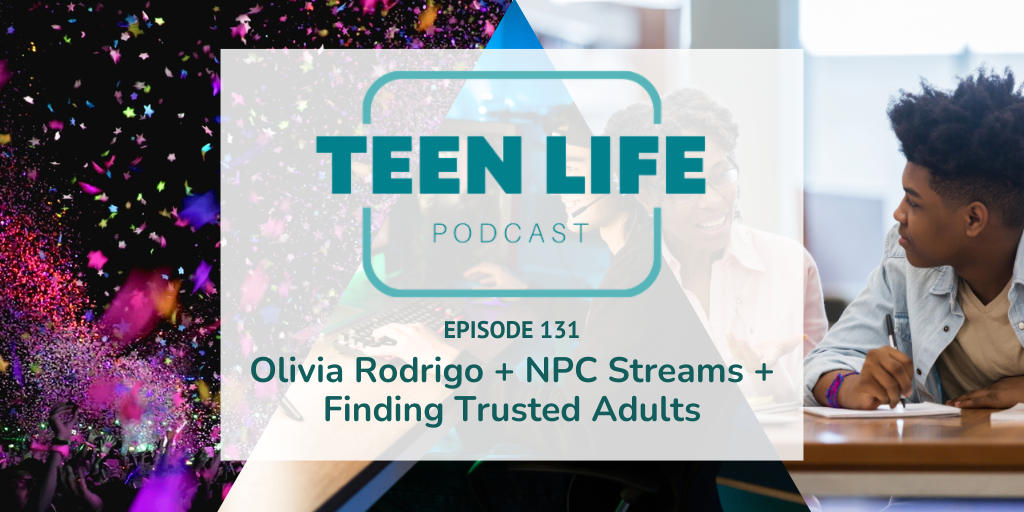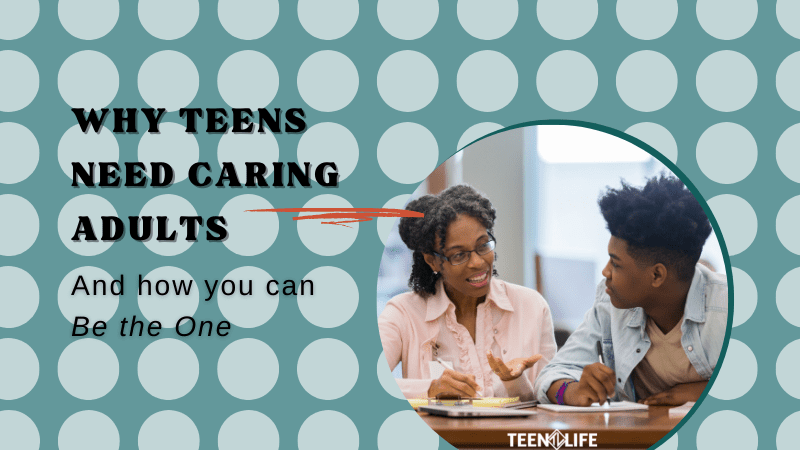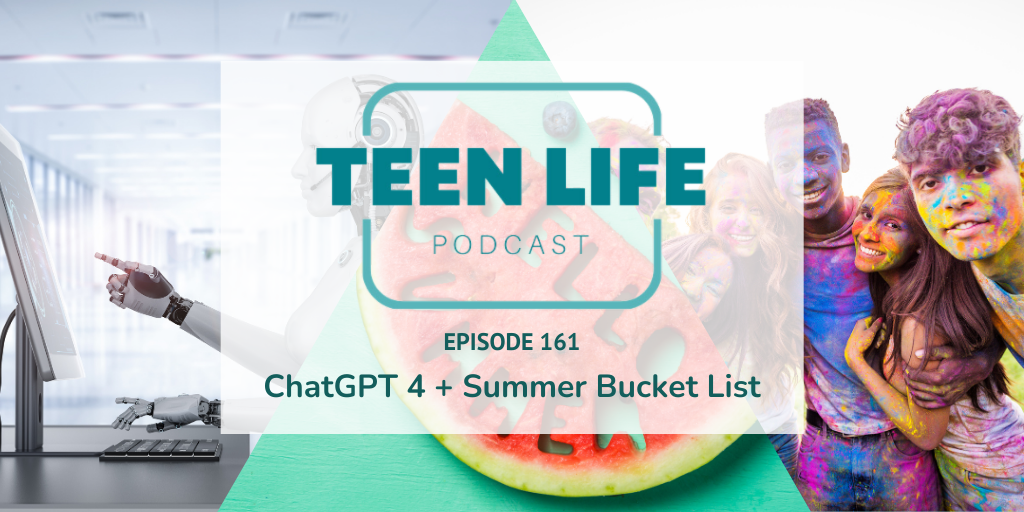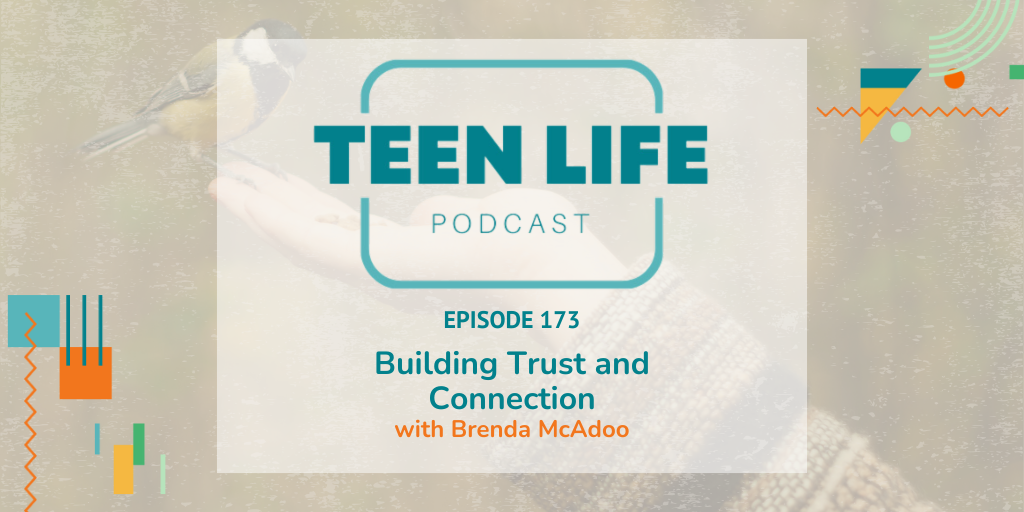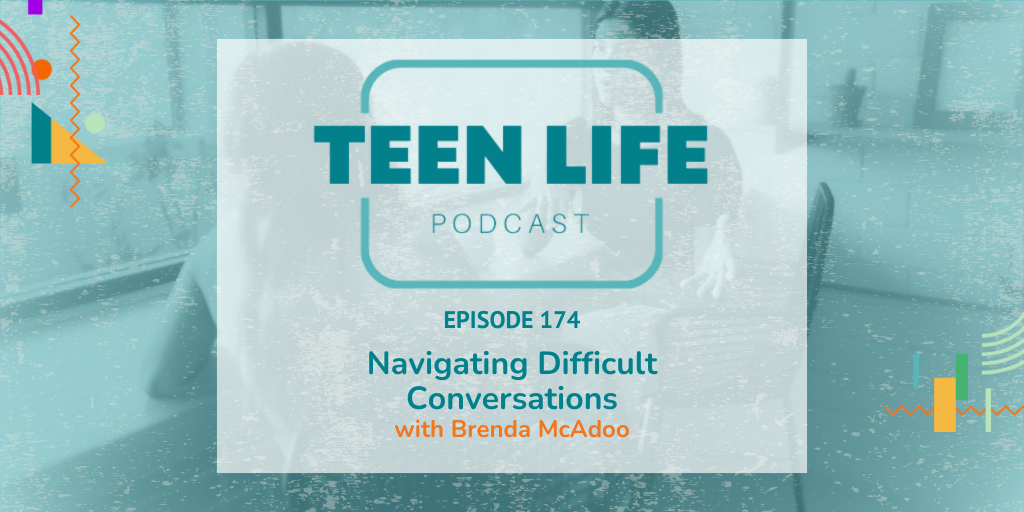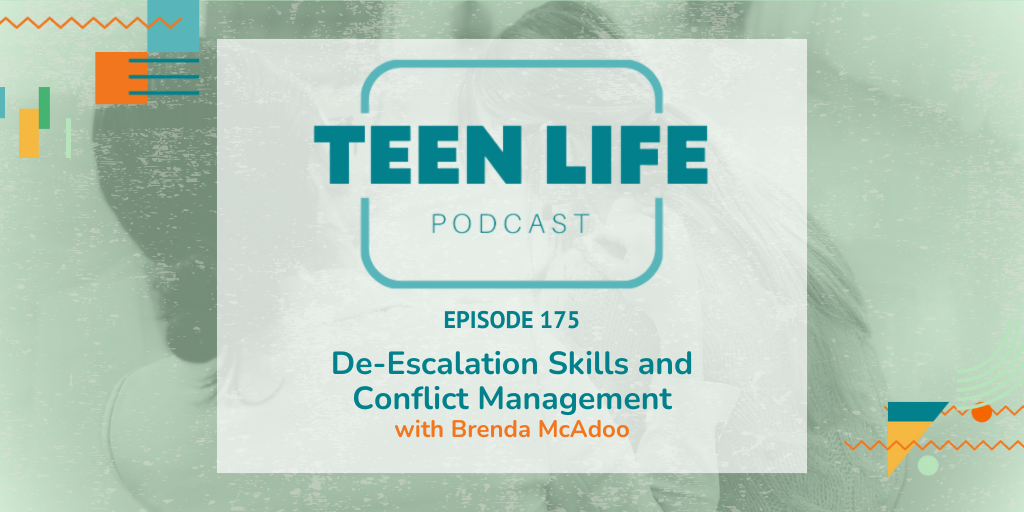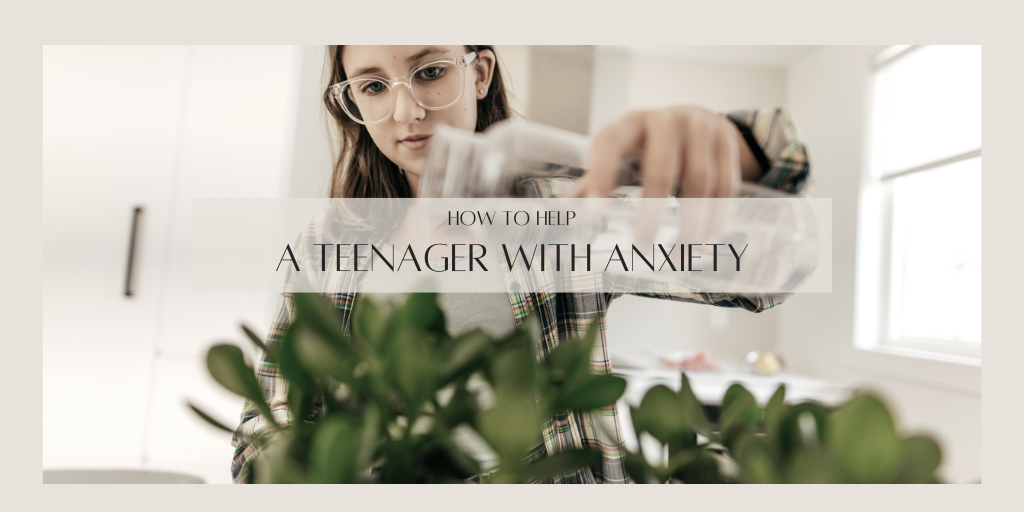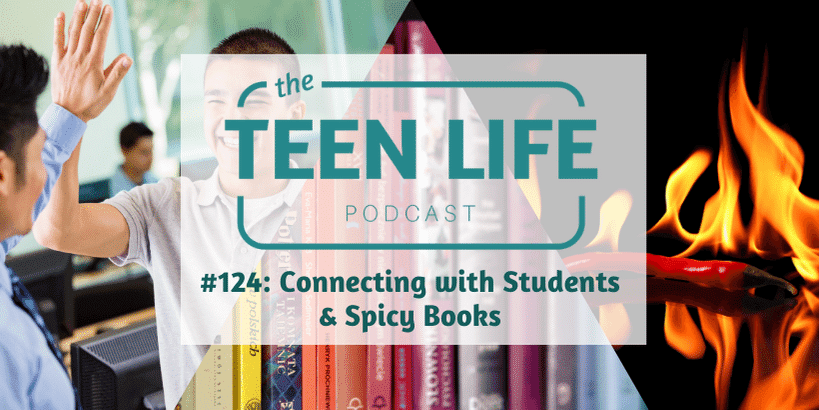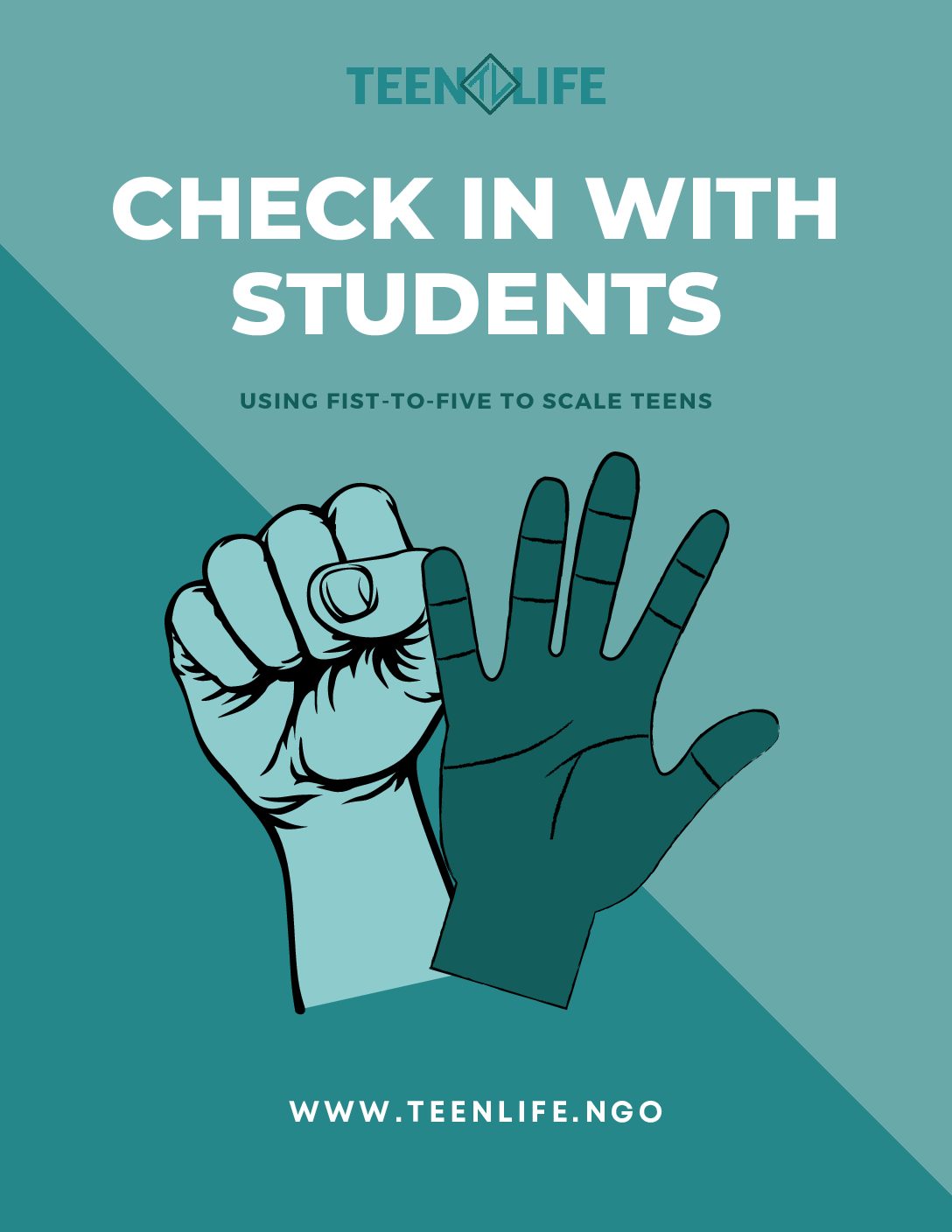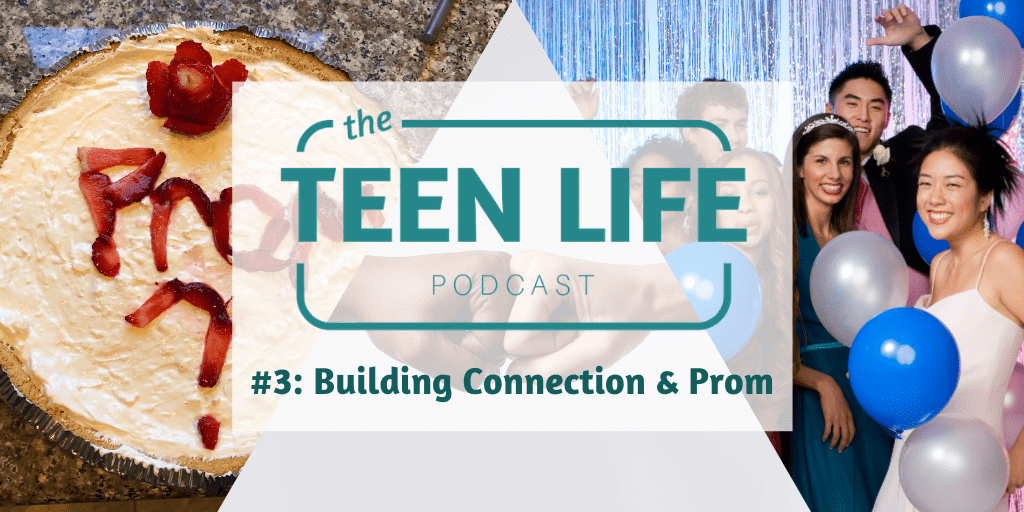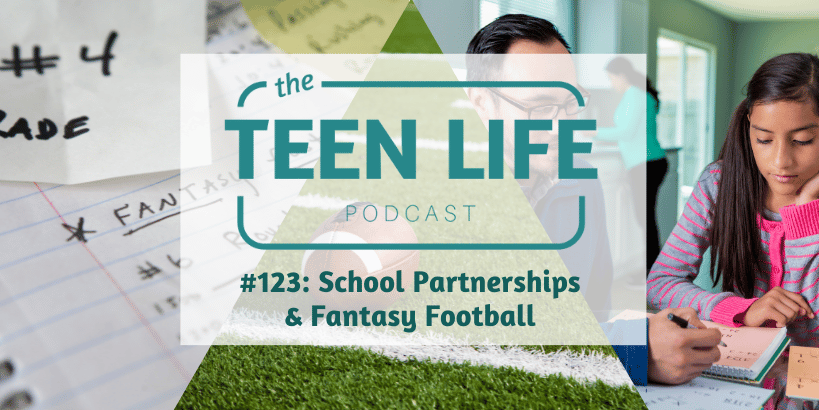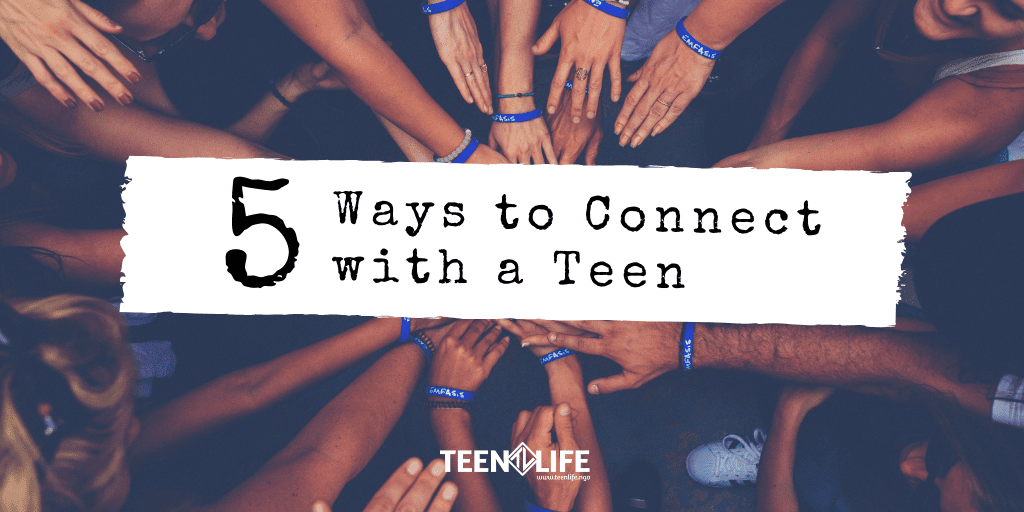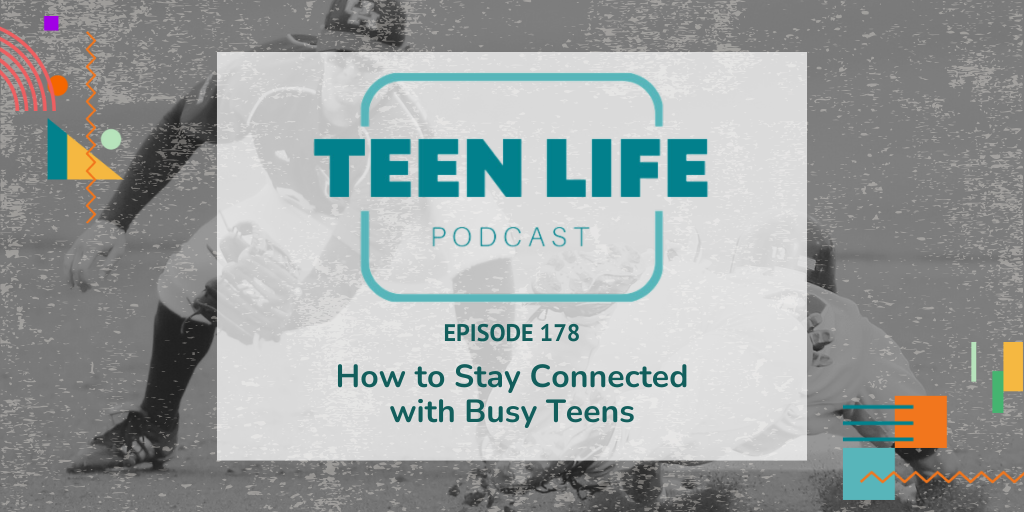
How to Connect with Busy Teens | Ep. 178
Podcast: Play in new window | Download
Even with a packed calendar, connection is a vital part of everyone’s health.
If you’re a parent, mentor, or caring adult who’s ever felt like connecting with teens gets harder when life gets hectic—we know exactly how you feel.
Whether it’s summer break, exam season, or just a stretch where everyone’s calendars are jam-packed, it’s totally normal to feel like you’re missing each other. But today, we’re flipping the script and talking about why these moments are some of the most important times to lean in and stay connected.
Key Question
How can I continue to connect with teens when schedules are busy and their normal routines are disrupted?
What We Cover
00:00 Introduction and Humor
02:57 Connecting with Busy Teens
06:03 Utilizing Everyday Moments for Connection
09:00 Meeting Teens Where They Are
12:03 The Importance of Presence
15:03 Consistency in Communication
18:03 Navigating Distant Relationships
20:48 Conclusion and Encouragement
Why This Matters More Than Ever
1. Teens Still Need Us
Even if they’re acting super independent or glued to their phones, teens still crave guidance, stability, and support from trusted adults.
2. Disruptions Can Be Stressful
A change in rhythm—whether it’s sports seasons, vacations, exams, or family events—can make teens feel overwhelmed or isolated. You can be their steady, calm in the chaos.
3. Small Check-ins Build Big Trust
You don’t need more time. You just need to make the most of the time you do have.
Perspective Shift
Over the summer, connecting might look different. But showing up matters the most when it takes more effort!
It’s easy to feel disconnected when schedules don’t align, but relationships with teens don’t have to be ‘all or nothing.’
Small moments of connection can make a big difference.
What can you do to make connection happen?
Try These 5 Simple Strategies:
Make the Most of Small Moments
You don’t need a long, sit-down heart-to-heart to connect with a teen.
Some of the best conversations happen during everyday moments—car rides, making dinner, running errands, or even during the commercial break of a show. Use those natural pauses to check-in.
Ask something light like, “What was one high and one low from your day?” or “What’s something funny that happened this week?” You can even try something playful like a “Fist to Five”—ask how they’re doing on a scale from a closed fist (zero) to five fingers. These mini check-ins help you stay in tune without feeling forced or heavy.
Use Technology to Your Advantage
When in-person time is limited, digital connection can bridge the gap.
A simple text saying, “Thinking about you today—hope practice went well!” can brighten their day more than you might think. Try sending a meme, a song you know they like, or an inside joke that reminds them you’re thinking about them.
If you want to make it more personal, record a quick voice memo or video message—something they can hear in your voice or see on your face.
These small gestures make it easy to stay connected in a format that feels natural to them.
Meet Them Where They Are
If your teen is in a season where they’re juggling a lot—school, sports, rehearsals, part-time jobs—connection might mean showing up where they already are, rather than pulling them out of their world.
Maybe you only catch the second half of their game, or you sit nearby while they do homework without needing to chat. These quiet ways of being present can speak volumes.
You can also ask about what’s capturing their attention: “What’s a song you have on repeat lately?” or “What show are you hooked on right now?”
Showing genuine interest in their interests builds trust and opens doors.
Be Predictable and Consistent
When everything around them feels chaotic or uncertain, teens appreciate something that feels steady.
Even one predictable point of contact each week can become a lifeline.
Maybe it’s a Sunday night check-in where you ask, “What’s coming up for you this week?” Or a regular stop for coffee or smoothies after practice. Even just sending a “Good luck!” text before a big test or performance shows you’re tuned in.
Consistency—more than quantity—builds a sense of safety and connection over time.
Keep The Pressure Low
Let’s be honest—teens don’t always want to talk when we’re ready to listen.
That doesn’t mean they don’t want to connect; it just means they need space and options.
Create low-pressure opportunities to be together- “Want to grab ice cream after practice?” or “I’m running to Target—feel like tagging along?” These small, no-expectation invitations give them the freedom to show up on their terms.
Even if they decline, the offer still communicates that you want to spend time with them—and that matters.
TL;DR: Tips and Takeaways
- Don’t take it personally if they seem distant—pulling away is normal and not about you.
- Keep showing up—your consistency speaks volumes, even when they don’t say much.
- Let them lead sometimes—Try simple, open statements like:
- “I’m here if you ever want to talk.”
- “No pressure, just checking in.”
Some Last Thoughts
Even in the busiest seasons, connection is still possible—and incredibly powerful.
It doesn’t have to be big or dramatic. In fact, teens often remember the small, consistent ways you showed up more than anything else. So keep reaching out, keep showing up, and know that your presence matters—maybe more than you realize.
Remember: you don’t have to be perfect, just present.
Have a question or a topic you’d love to hear about? Reach out on social media or email us at podcast@teenlife.ngo.
Read Episode Transcript
Karlie (00:00)
How can I continue to connect with teens when schedules are busy and their normal routines are disrupted? So we are heading into end of school year, going into summer. And so I feel like this is such a timely question because right now teens are probably busier than they’ve ever been with finals, wrapping up all of their things, kicking off summer and then summer.
When I was a kid, Summer, was you didn’t do anything and that is not the case anymore. They do…
Caleb Hatchett (00:29)
Yeah. It’s, it’s getting shorter and shorter also. Like people are starting bandcamp like halfway through July. Like it’s crazy. I’ll plan a mission trip and it’s like, sorry. Sorry. You can’t go in June cause it’s bandcamp. I know, it’s intense. Yeah.
Karlie (00:34)
Well, that’s fair, but they…
Bandcamp is no joke too. But that’s what they do camps.
We’re doing sports are still going if they’re doing select club, AU, all of the things. Many older teens are also working, you add that they’re going on trips, they’re doing mission trips. so schedules just aren’t.
Caleb Hatchett (00:53)
Yeah, club, yeah.
Karlie (01:04)
even normally what they are, but this doesn’t just apply to summer. think as we’re talking about this, think through if you have a student who is in the middle of their sports season or is in the middle of band season or they’re in a play and they’re going to practices every single day and their routine just looks different. How do we connect and how can we keep going when they’re busy and you’re like, wait, I can’t even find a time to talk to them, whether you’re a parent or outside and
Caleb Hatchett (01:06)
No.
Yeah.
Karlie (01:33)
That’s almost even more difficult because you’re not seeing them as often. But it’s going to look different and that’s okay. I will say kind of maybe as our perspective shift, during these times when they’re busier and it’s more difficult, if you continue to show up, it’s going to make a bigger impact. Because you’re showing them, even when this is the toughest it’s going to be, I’m willing to step into that.
Caleb Hatchett (02:00)
Yeah.
Karlie (02:00)
And that shows you really care because you’re not just doing it when it’s easy. You’re
doing it when you’re having to text me five times and go, hi, still here. You’re not answering me, but still care about you. Hope you’re doing good. And that shows a lot to a student. And it doesn’t have to be this all or nothing of we have to be super connected all the time or I’m not connected at all. And I’m just going to fall off looking for these small moments can make.
Caleb Hatchett (02:09)
Yeah.
Right.
Yeah.
Karlie (02:28)
a big difference.
Caleb Hatchett (02:29)
Yeah. I, you know, I think, you know, even, even using everyday moments, is what is going to have to happen, especially when they’re busy of, you know, taking advantage of the times that are just already prebuilt into a day, ⁓ car rides, meal times, commercial breaks, you know, like of, using, you know, maybe the thing that, you know, they are decompressing, but you still want to make the most out of the time. And yeah, it doesn’t have to be something big. It doesn’t have to be, Hey, let’s go, let’s go and make like a big day out of something. If they’re in the middle of just busyness and just need time to decompress, need time. It’s not too much. You can still check in.
Karlie (03:02)
Mm-hmm.
Caleb Hatchett (03:13)
Without adding to all of the busyness just do a quick check-in. Hey, what’s a high and a low from today? Whoop and a poop if you tuned in last week What’s something funny that happened this week a fist to five on just how your day or you haven’t talked to him Until the end of the summer how the summer was going Just take advantage of any small moment that you can
Karlie (03:25)
Bye!
Right.
Well, and especially if you’re a parent, you are going to have those little moments more because you’re with them. So you are gonna be in the car with them. You are gonna maybe eat a meal with them or be sitting around watching TV and mute it during a commercial to be like, hey, catch me up on your day or what’s been going on. If you’re not a parent and you don’t have those little moments, come up with something that you just shoot off every now and then. Earlier this year,
Caleb Hatchett (03:47)
Yeah.
Karlie (04:09)
Teen Life was going through transition and life was crazy busy. And I had a Teen Life friend who would text me fist to five, are you doing today? And it was quick and it was short and I could respond with, you know, I’m at a four today. It’s actually going pretty good. Or today is a two. It has been tough. And we didn’t, she wasn’t taking too much of my time, but every time it showed, man, she cares enough that she’s going to continue.
Caleb Hatchett (04:17)
Hmm.
Yeah.
Mm. Yeah.
Karlie (04:35)
to check in and even something like that where you don’t have to give an explanation, but a student could just be like, how many thumbs up are we today? And like, how many booms I’m going to give today? Three booms. Like, I don’t know. Sawyer would be. Yeah, all in on that. Maybe it’s just that you send every now and then gifs back and forth. And if you haven’t heard from a while, send them a funny gif of like, hello, you there? Like make it funny and not.
Caleb Hatchett (04:44)
Yeah.
Yeah.
Yeah
Karlie (05:04)
feels so heavy or like it’s one more thing that they have to keep up with. But at the same time, if they are this busy, it’s stressful. And so I think sometimes we think, they’re busy. They don’t want to hear from me, but sometimes they need more support and they need more help than ever before because that is incredible. Like the sports, the family, the not having their normal routine, they are probably feeling overwhelmed.
Caleb Hatchett (05:08)
Yes. Yeah.
Yeah, yes.
Karlie (05:31)
They might be feeling isolated if they can’t be around their normal friends. And so those small check-ins mean so, much. And so I kind of, we already mentioned this, but use technology to your advantage. Even as a parent, yes, but even if you are a parent of just like, hey, they left super early for practice and I’m not seeing them till tonight. Hey, thinking about you right now, hope practice is great. You don’t have to ask anything.
Caleb Hatchett (05:38)
Yeah.
Hmm, especially if you’re not the parent. Yeah. Yeah.
Mm-hmm.
Karlie (05:57)
Hey, heard this song today. Have you heard this one? I liked it. Hey, have you seen this show yet? Or, hey, let’s put this on the calendar to go see this movie when it comes out. Something like that, that can be short voice memos. Voice memos honestly kind of stress me out because I don’t like that they disappear because then I forget about them. I don’t know. That’s just, I know you can, but sometimes I forget and then I’ve forgotten. I was like, I don’t
Caleb Hatchett (06:00)
Yeah.
⁓ okay. huh. You can hit keep on them and they stay.
Karlie (06:24)
what they said. It’s been a long time.
Caleb Hatchett (06:26)
I guess that is
how to have a conversation. If the last thing they said disappears forever. Yeah.
Karlie (06:30)
Exactly. But
you can’t keep it. But maybe you shoot off a quick voice memo of, I know you’re busy, but this just happened and I wanted to tell you about it. And you tell them a story where they don’t have to be available right that second or shoot them a video. I was going to say, I know kids FaceTime all the time, which is once again, wild to me because if someone just out of the blue FaceTimes me, something is wrong. Like someone is in trouble, but they do it all the time. So maybe do it back.
Caleb Hatchett (06:37)
Yeah.
Mm-hmm.
Yeah.
So the quick FaceTime. Yeah. yeah. I think yeah. Using technology, especially in the midst of busyness, you know, can be, Hey, just checking in, making sure that they know you’re there and doesn’t have much expectation. You know, you know, don’t be like, you know, overbearing of, you didn’t text back. Like you sure you’re okay. They might just be busy.
Karlie (07:12)
Mm-hmm.
Caleb Hatchett (07:19)
You know, but you know, they’re not texting back. Just continue to say, Hey, here’s this weird gift song I found, you know, try to keep it low expectation response from them. What.
Karlie (07:29)
I had
a college roommate, my freshman roommate, and I’m not saying you need to do this, but it just made me think of this and it was so funny that one day, I think I was in class and she sent me a text and I didn’t immediately respond. She, no joke, sent me probably 50 individual words. Hey, are you there? Hello, can you help me? What are you doing? Why aren’t you answering me? Like, I mean, a million. And so I’m not saying do that.
Caleb Hatchett (07:53)
Yeah
Ha
Karlie (07:56)
But
if they don’t respond to you, just be like, checking in again, see above. Don’t make them feel bad, but you can poke fun about that. Man, you must be crazy busy if you’re not answering. Just keep going. Just keep going and see how, hey, yeah, gonna see how many texts it takes for you to reply to me. I don’t know. It could be five, we’re at 10. Or just like check and count 10 unreplied messages. Here we go.
Caleb Hatchett (08:00)
Yeah. Yeah.
Yeah, lean into this kid. Yeah.
You
zero day, 10 days since last message replied. Yeah. Yeah.
Karlie (08:22)
Yeah. Yeah. Like please mark yourself as safe. At least send
an emoji. Let me know you’re okay. So leaning into that, I will say also meeting them where they are. When you’re hearing us say that, don’t, especially if they’re busy or crazy, try not to expect more of them. But maybe for this season, they aren’t showing up to Wednesday night for you, Caleb, because they’re busy.
Caleb Hatchett (08:32)
Yeah.
Yes.
Mm-hmm.
Karlie (08:46)
you know what, I’m gonna look next week and I’m gonna go to one of their games and I’m gonna show up for them. Or I’m gonna go to their one-act play because I know that this is important to them and they’ve put so much effort into it that I’m going to honor that and make sure that they know that I’m there. If you’re a parent and they have a crazy amount of homework, maybe it’s going and sitting next to them and doing work on your computer while they’re doing homework. So at least presence-wise,
Caleb Hatchett (08:58)
Yes.
Yeah, your presence. Yeah.
Karlie (09:13)
you’re there. doesn’t always have to mean a super deep connection, a super deep conversation or ask him questions. It could just be like, Hey, I’m here.
Caleb Hatchett (09:20)
Yeah. And you know, I think I’ve always been surprised by how much it really does mean to a student that, you, you showed up like to, to this game, to this thing that, you know, sometimes, sometimes most of the time they will be like, Hey, you coming, you coming? And like, they won’t let you forget, but especially for the ones who just kind of like, yeah, you know, I have a game this week.
Karlie (09:27)
Mm-hmm.
Hahaha!
Mm-hmm.
Caleb Hatchett (09:45)
And you know, like if you were able to pick up on that and be like, you know what? They didn’t necessarily explicitly ask. It means so, so much. And yes, even to the ones who annoy you and begging you to come to the game or come to the play, whatever it means more than I think you can know because it’s, you know, they probably know you’re busy. and even if they don’t, it’s like, man, makes them feel good about themselves. so meet them where they’re at.
Karlie (10:00)
Mm-hmm.
And I’ll say if you’re
a teacher too, you probably, can’t go to all the things. There’s no way, especially if you’re a high school teacher and you’ve got, I don’t know, 100, probably more students that are in your classes. Pick two students that this semester I’m gonna show up for one thing that they do. Or try to pick, hey, I have this, I’ve got five basketball players in my class. I can knock out five by going to one game.
Caleb Hatchett (10:28)
Yeah.
Yes.
Karlie (10:37)
or I’ve got
lots of kids that are in band and on the football team, so I’m going to show up to a game. Or if you have a student that you know is very stressed, asking them, hey, what are you involved in right now that is also taking up a lot of your time? Okay, I can tell that means a lot to you because of how much time it’s taking, so that’s what I’m going to show up to this time. And so thinking through things like that instead of just being like, well, this is ridiculous that…
Caleb Hatchett (10:52)
Yeah.
Yeah.
Karlie (11:02)
you’re having such a hard time in my class because of that, but being like, man, this is important enough to them that they’re trying to squeeze it in. And so I’m, I want to see what this is about and go support them.
Caleb Hatchett (11:05)
Yeah.
And I think too, like it’s, you don’t have to be a super fan. Like, you know, don’t have to show up to every single game with a big fat head. Like it’s like, if you want to do that, that’s great. But yeah, choose one, especially if it’s a long season with a lot of games, like choose one or two, one a week, one every three weeks. ⁓
Karlie (11:18)
Right.
Mm-hmm.
Mm-hmm.
Caleb Hatchett (11:33)
You know, you can also just keep a running calendar. If you’re a student minister, enable your volunteers to just also choose just one. And then with enough people, you’ll cover, you know, hopefully the whole youth group. And, you know, some things are, you know, more important than others. One regular season game versus, you know, a playoff game or a one act play that only happens once a year. You know, it’s okay to prioritize some of those, you know, if you know.
Karlie (11:54)
Mm.
Caleb Hatchett (12:02)
Your students or student is in a play and you can mark that off months in advance to make sure that you’re there because it only happens once You know some things will take priority, but don’t don’t feel the need to show up to everything but continue to meet them where they’re at and even in the midst of the busyness I think this can also look like You know meeting them where they’re at and their schedule and in their wants and interests of if they are busy
Karlie (12:12)
Mm-hmm.
Right.
Caleb Hatchett (12:28)
you know, see if they, the student can carve out one afternoon for coffee, you know, if they like coffee or if they like whatever, but just in the midst of the busyness, see, you know, meet them where they’re at in their interests and in their schedule to see if you can have time to check in person to person.
Karlie (12:45)
When I think in that of what you’re saying, like if you can be consistent where and when, especially if nothing else is, our dad is really good at this. Was really good at it when we were in high school and I’m the only one still living here. So I get the benefit of still getting weekly lunches with my dad of every Thursday I just know unless every now and then something comes up and we’re understanding of that and we can move it around, but
Caleb Hatchett (12:49)
Yeah.
Mm-hmm.
Yeah.
Karlie (13:10)
Thursdays, I eat lunch with my dad. And when I was in high school, I think it was Tuesdays. I think you did breakfast.
Caleb Hatchett (13:15)
It was.
We, we that, yeah, we would go breakfast every game day. you know, every Friday we would go get Chick-fil-A and then even like when I was in high school and you know, there was a time where we overlapped, you were back from college. was still in high school every Tuesday. Me, you and dad would go grab lunch. And so, and yeah, he was, he and mom were at every game at every thing that we did. And it was, you know, looking back.
Karlie (13:34)
Mm-hmm.
Mm-hmm.
Caleb Hatchett (13:45)
I don’t think I recognized it, how important and maybe rare that was as a teenager, but it still meant a lot that they were at everything. think whether I knew it or not, it communicates this person cares. ⁓ and for a student who especially might not have that from their home life or from their parents or other adults in their life, if you can be consistent,
Karlie (13:50)
Mm-hmm. Mm-hmm.
Mm-hmm.
Caleb Hatchett (14:10)
Again, maybe not every game, be consistent enough to show interest and to show up. It means so, so much.
Karlie (14:17)
Right, and so if you’re not a parent, that could look like sending a good luck text before big events of, I know you’ve got this going on today, good luck. Or let me know how it goes after, or even taking the time anymore, especially with sporting events, the school on social media somewhere will post the outcome of that game. So if you can’t go to the game, even without asking, hey, how’d it go? Hey, I saw y’all won a big one tonight, congrats.
Caleb Hatchett (14:21)
Yeah. Yeah.
Yeah.
Yeah, I love that.
Karlie (14:44)
showing
that you took the step to go looking for how they did. And you might not know how they did individually, or sometimes you did. Maybe if they’re the star of the football team, hey, I saw you got three touchdowns tonight. That’s incredible. Showing them that you care in that way. It could also be once a week or once a month at the beginning of every month, hey, what’s coming up for you this month? How can I be praying for you? What are some things that are stressful? Is there anything I can…
Caleb Hatchett (14:48)
Yeah.
Right.
Karlie (15:12)
help you with this month where you just know I’m going to do this every Sunday or every the first week of every month I’m going to kind of see how they’re doing and they know it’s coming and it’s just a consistent this what we do.
Caleb Hatchett (15:18)
Yeah
And
like we said off the top, they, teens might not necessarily communicate that they like structure. They function well under it. And like, I’ve been surprised. I get lunch with the student every month. And if sometimes I’ll forget, he’ll remind me because it’s part of the routine. It’s part of the consistency and predictability of us getting lunch and you know, like make it fun. And I think it even goes back to me the more they’re at every month, me and the student try to go somewhere new to eat.
Karlie (15:31)
Mm-hmm.
Hmm. Right.
Mm-hmm.
Caleb Hatchett (15:54)
And we, you know, we try some things and, know, it’s, fun. It’s consistent, but I think you’ll be surprised too. Once you establish this consistency and predictability, how much they depend on it and want it as well.
Karlie (16:06)
That’s good. So to kind of wrap up this episode, we do kind of want to give some advice if they seem distant or you don’t feel as connected. So you’re trying these things and you’re just going, man, we just are in a season where I cannot connect with this student. I’m not feeling as connected to my kid. First of all, don’t take it personally. I think automatically teens are going to go through phases where they…
Caleb Hatchett (16:14)
Yeah.
Karlie (16:28)
have a lot of time or where they don’t, it’s often not about you. It’s about what they feel like they can handle in that moment. So don’t take it personally and get your feelings wrapped up or even like given to maybe some of the drama that their friends do, which is, are you mad at me? Hey, what’s going on? Like you don’t have to do that and just maybe remind yourself, hey, they must have a lot going on right now and I’m going to give them extra grace in a time where maybe they’re not getting that.
Caleb Hatchett (16:45)
Yeah, right.
Yeah. Yeah.
Karlie (16:57)
I also think it’s so important to show up anyways. If they don’t always respond, you can still offer again. If you are consistently reaching out, if you’re consistently showing up at their games or like we’ve said, if you have a student that’s not responding to a lot, show up at their next game and that way they see you in person. And once again, I think sometimes that triggers in their brain, hey, you care enough that even in the hard times, even when I’m not giving you anything back that you’re showing up for me.
Caleb Hatchett (16:59)
Yes.
Yes.
Yeah.
Yeah. And I, know, in those moments you’re showing up, yeah, you sometimes just you showing up will be all the communication that needs to happen. doesn’t need to be adding on a layer of guilt of, man, wanted to make sure you were alive. know, like it’s just, Hey, you did great, man. I’ve missed seeing you talking to you. It was glad to get to see you, you know, just can communicate so, so differently than, throwing on the guilt on them.
Karlie (17:35)
Mm-hmm.
Right.
Mm-hmm.
Caleb Hatchett (17:54)
when they’re already in the middle of a busy season. But yeah, keep showing up and let them take the lead instead of asking questions, try statements like, hey man, I’m here if you ever need to talk. And again, I think you’ll be surprised if you establish that consistency and relationship, how much they rely on you. No pressure, just wanted to check in how you’re doing.
Karlie (18:12)
Mm-hmm.
Caleb Hatchett (18:19)
balancing this need of a lot of times students have a lot going on and they’re not organized enough to be like, it needs to text Caleb today, right? Like check in. Yes, but still let them take the lead on, on what to do on how they’re doing everything like that.
Karlie (18:36)
Right. All good stuff. We just really want to encourage you as we head into a busy season, a different season, a disrupted season, that you will find ways to connect with teens, that you will find ways to let them know that they’re seen and they’re loved. And even if they aren’t responsive or even if they aren’t able to juggle all the things,
maybe in a way that they would even like to that you’re gonna continue to show up and care for them. And that is what really matters. So as always, this has been a great season of the Teen Life Podcast. We’re loving answering questions and talking through topics that are hopefully gonna help you connect to the teens in your life. So if you have questions that you want us to cover, make sure that you reach out on social media or email podcast at teenlife.ngo.
Caleb Hatchett (19:02)
Yeah. Yeah.
Karlie (19:26)
You can always subscribe on YouTube or wherever you listen to podcasts so you don’t miss future episodes. And we’ll see you later.

Karlie Duke
Communications Director

Caleb Hatchett
Podcast Host
Karlie Duke | Director of Communications
Karlie has always had a heart for teenagers. Through her role at Teen Life, she loves to showcase the amazing stories coming out of Support Groups, but she is especially passionate about helping adults and teenagers find connection. Karlie has a BS in Communications with a minor in Family Studies from Abilene Christian University.
Caleb Hatchett | Podcast Co-Host
Caleb loves helping teenagers take ownership of their faith and relationships. He graduated from Abilene Christian University with a degree in Youth and Family Ministry and is currently Student Ministry Director at Jenks Church in Oklahoma.









